SLC S21W4/ Didactic games for better learning.
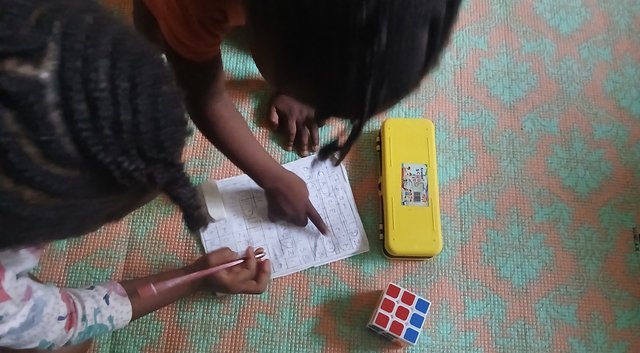
A didactic game is a type of educational tool that makes learning fun by combining learning with fun activities and interactive elements.
Didactic games should be considered a great example of edutainment - a nice blend of education and entertainment to engage learners, making the learning process a fun activity.
To avoid running a "chalk and talk" traditional method of teaching/learning, the incorporation of didactic games that leverages the fun to transfer skills and knowledge in a way students could not absurd when in their learning mode.
This is necessary because a large number of pupils learn and retain better when in their play mode.
Examples of didactic games
Some didactic games are board games like monopoly, the Game of Life, scrabble, chess, and risk. The card versions are math war science scene investigation (SSI) and history mystery. The puzzles category includes crosswords, brain teasers, 3D puzzles,sudoku, KenKen, Rubik's cubes, and word search.
Using helpful materials, create a teaching game of your choice that you want to use to teach a child aged 4 to 12. At the end, he presents the didactic game to the child and plays with him.
I would love to create a word search puzzle as my didactic game to help my daughter develop her spelling skills. My girl is 4 years old, and she is finding it difficult to cope with spellings in school. Using a playful learning process to enforce spelling will make it easy to learn and retain the lesson.
Explain the creative process step by step, including illustrations. Don't forget to share the materials used and the final result.
[3 points]
After I decided on a word search puzzle, the next step was to collect the materials that would be needed for the word search.
| S/N | Item | Quantity |
|---|---|---|
| 1 | A blank page | One |
| 2 | A ruler | One |
| 3 | A pen or pencil | One |
| 4 | An eraser | One |
| 5 | A list of words | *** |
Got the paper laid out and drew some horizontal lines on it with the help of the ruler and pen.
After drawing the horizontal lines, I drew some vertical lines to crisscross the horizontal lines, creating boxes.
I had to sprade the selected words one alphabet at a time on each box.
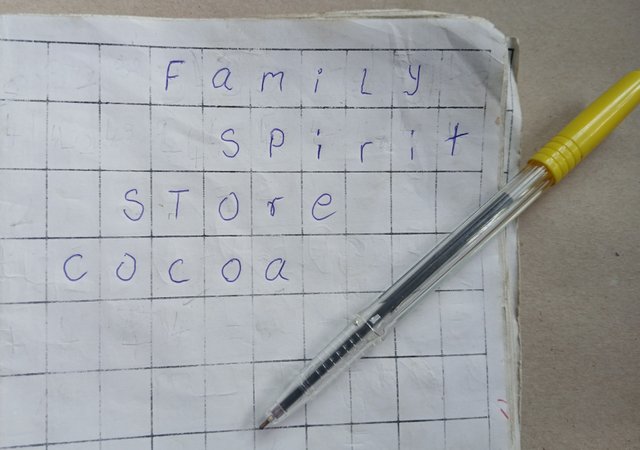
After I inputted all the words, I had to fill in random alphabets in the remaining boxes.
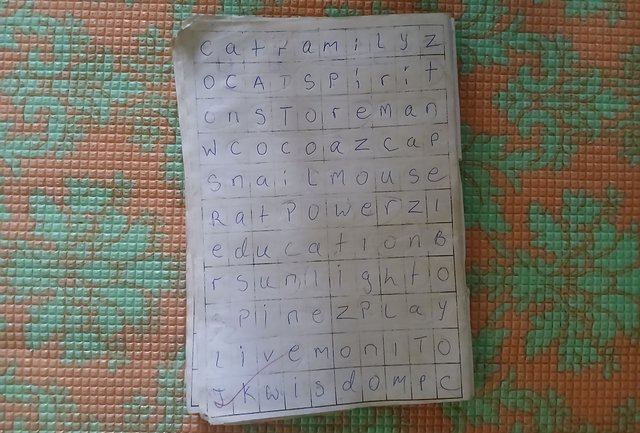
I made sure the words were words my kids are learning in school, words that are for their age.
I also avoided other orientations for now. All words were only horizontal. We will soon go vertically and then diagonally as they get older.
Describe the purpose of the didactic game what did you elaborate, What do you want to teach with the game?
[1 point]
The purpose of the didactic game, as I stated earlier, is to teach and enforce spelling skills, but this comes with critical thinking, problem-solving, and knowledge retention skills as added advantages through interactive and engaging activities. The word search comes as a combo pack with logical reasoning, pattern recognition, and decision-making skills. It is also a good way of keeping my daughters productively engaged.
The game is designed to promote active learning, encourage experimentation, and provide a fun, challenging experience for my girls, who are the learners in this case.
In your own words, explain how to play
[1 point]
Objective:
Find and identify the hidden words from a grid of seemingly random alphabets.
The game is simple and straightforward: among the random-looking alphabets, identify the hidden words, then using a pencil to encircle the words you spot.
Steps:
- Carefully examine the letter grid.
- Identify hidden words horizontally.
- Use a pencil to encircle each discovered word.
- Continue searching until all the words are found.
- Use a systematic approach to avoid missing any words.
Ready, Set, Search!
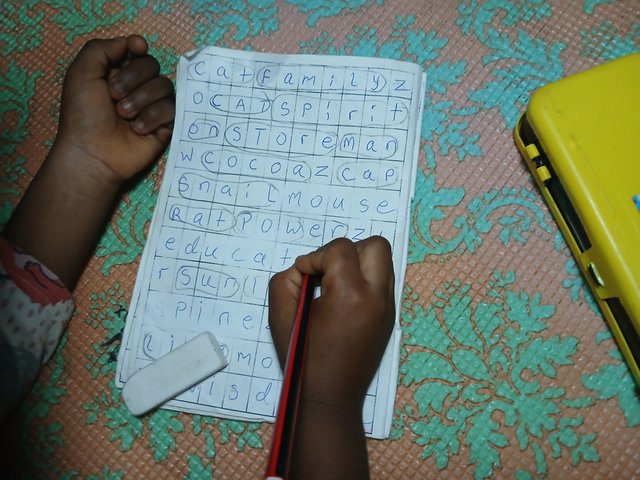
Did the child like the game? Did it bore him or was he entertained? Do you think that this game contributed to the child's learning? Tell us about your experience and that of the child playing with the educational game.
[3 points]
Yes, my kids had all the fun playing the game. I kept an inviting incentive to be collected after completing the game.
The word search definitely is contributing to their learning different skills, vocabulary, and concentration.
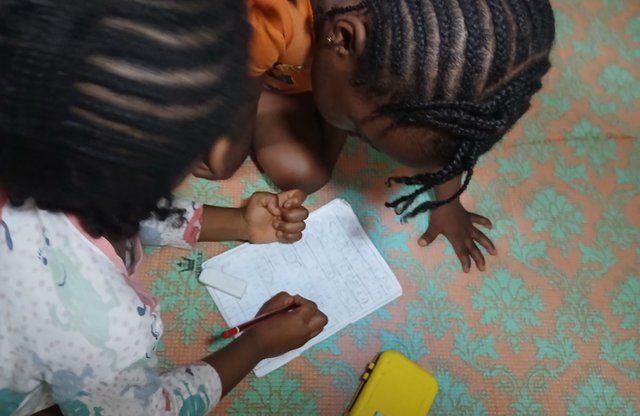
The game was accepted naturally; I only had to jump-start it by solving three words from the grid, and my girls could follow up from there. I was very happy when a neighbour came over and was impressed seeing how they could concentrate and find words, then run to me to announce their discovery of a new word.
They discovered many words when I was talking to the neighbour, such that she got interested and asked for the rules of the game so she could catch-up with the fun.
Don't forget to upload photos or videos of the child playing with the educational game.
[2 point]
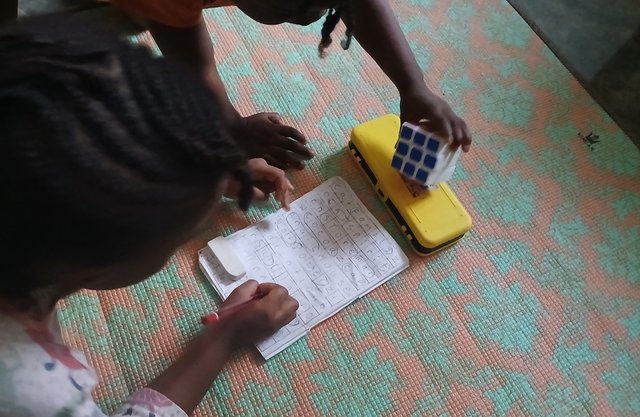
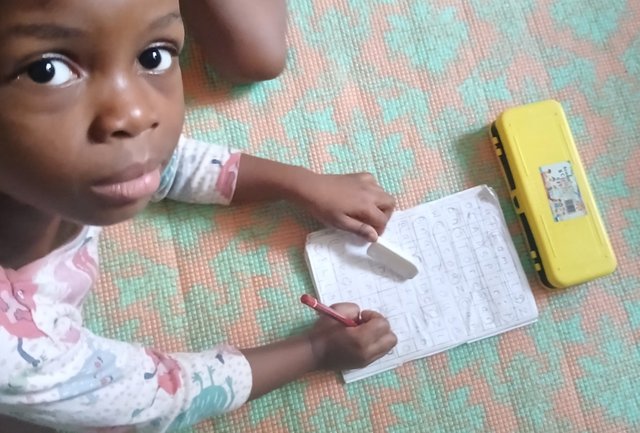
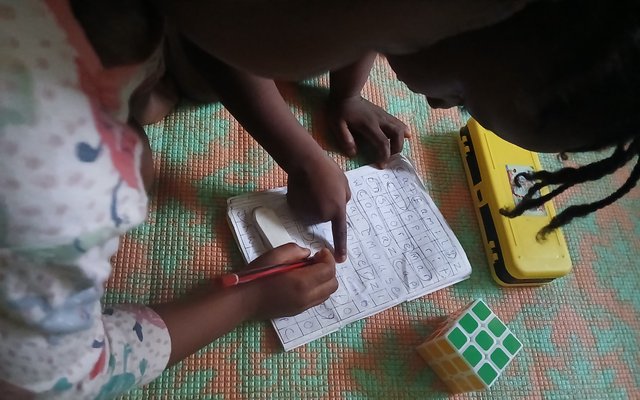
***
| Family - Spirit - Store - Cocoa - Cat - Man - Rat -Education - Snail - Sunlight - Mouse - Power - Spine - Live - Play - Wisdom... |
|---|
https://x.com/udyliciouz/status/1859178029085340041?t=ceuel05ML9e7GnnwGtnCAQ&s=19
Hola
Ma sopa de letras es un juego muy didáctica donde los niños se entretiene y aprende mucho.
Te deseo éxito en la participación